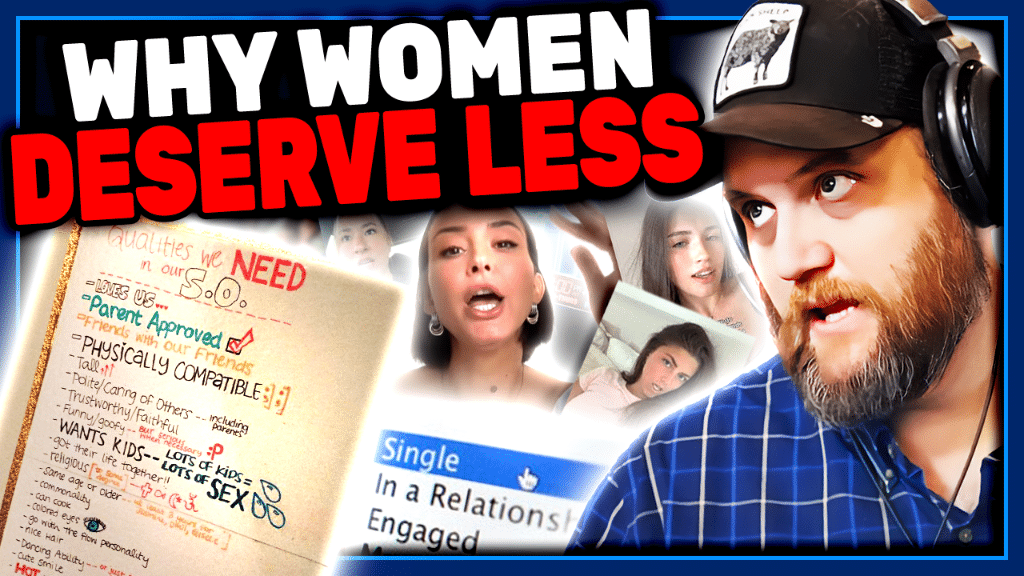
They Harassed Youtuber SaveAFox Into Taking Her Life So I’ll Unmask Em! Mikayla Raines & Save A Fox
June 25, 2025
Karmelo Anthony SPENT ALL THE MONEY! May Lose ALL FUNDRAISING! Victims Dad Replies & Tribute
June 26, 2025The Great Relationship Reckoning: Are Women Finally Waking Up to the Truth About Modern Dating?
In a recent deep dive on our YouTube channel, “TheQuartering,” we explored a growing phenomenon that suggests a significant shift in the landscape of American relationships. It appears that many women are reaching a critical juncture in their pursuit of romantic partners, often finding themselves at a crossroads of financial independence and profound loneliness.
The Self-Sufficient Woman and the Shifting Paradigm
We highlighted that a woman who is financially self-sufficient, able to pay her own bills and live independently without relying on family or a man, is, in a profound sense, breaking generational trauma. This self-sufficiency, while laudable, has coincided with a concerning trend in the dating market. We observed that the challenges of finding a suitable partner have been complicated by what we see as a growing divide in education and career prospects between men and women. Our analysis suggests this disparity is not accidental; it is a direct consequence of third-wave feminism prioritizing women in college over men, leading to a significantly higher percentage of women pursuing higher education and, consequently, often securing better jobs than men.
Unrealistic Expectations and the Cost of Promiscuity
A core issue we identified is the burden of unrealistic expectations placed on men by many modern women. We contend that women have been raised to expect a man who is not just a partner, but a therapist, best friend, passionate lover, future father of the year, financial provider, and even a mind reader, all wrapped into one “devastatingly handsome package”. This expectation often includes a college degree, a six-figure salary, handyman skills, and emotional sensitivity. Meanwhile, we argue that men seem to have a more pragmatic approach, prioritizing and putting up with more overall, while women are often found with “spreadsheets of required qualities,” leading to perpetual disappointment.
Furthermore, we asserted that third-wave feminism misled women into believing that promiscuity was acceptable and that men “wouldn’t care about high body counts”. Now, instead of recognizing the implications of these choices, some women are reportedly blaming men for not making enough money or for perceived shortcomings. We believe this cycle is culminating in a lifetime of loneliness for many women in their 30s and mid-30s who have never known lasting love.
The Commitment vs. Casual Fling Market
Our discussion also emphasized the critical difference between the “casual fling marketplace” and the “commitment marketplace”. We pointed out that while even “the ugliest of women can always find someone willing to sleep with them,” and dating apps can yield “10 matches in 10 minutes,” these platforms often function primarily as “hookup apps in a trench coat”. The pool of truly viable men for commitment reportedly shrinks significantly after a woman’s late 20s, yet women often misinterpret the abundance of casual matches as endless opportunity. Men, we argue, have understood the zero-sum nature of the commitment marketplace for years, aiming to “win and get out of the pool as quickly as possible”.
The “Girl Boss” Dilemma and Gender Roles
A significant paradox we highlighted is the “girl boss” phenomenon. Women have been sold a “lie” that they “can have it all”—a successful career as a “girl boss CEO” and a “guy boss CEO” partner. However, our observations suggest that highly ambitious men, often with high work drives, are typically looking for a “supportive role spouse” who will focus on raising children and helping them achieve their own goals. We find that very few marriages successfully navigate two highly ambitious spouses pursuing big career goals simultaneously, especially with children.
We’ve found that high-drive men generally don’t care about how much a woman makes financially, but rather whether she can “fill in the gap” by taking care of household needs, children, and supporting his ambitions. We argue that this is why traditional gender roles exist. The problem arises when women who embody the “unstoppable girl boss” archetype also desire an “unstoppable boy boss,” because, as we suggest, those men often do not want a partner with similar career aspirations; they often seek “arm candy” who will maintain appearance and home life. We contend that third-wave feminism’s push to deny gender roles and even gender itself has contributed to this societal imbalance.
A Society Checking Out of Dating
The consequences of these trends are starkly visible in recent data. Andrea, a 29-year-old Boston-based accountant, exemplifies this shift. Despite being financially self-sufficient, she recently called off her search for a husband, now planning to buy a house solo and consider having children on her own. While she states she is “willing to accept being single versus settling for someone who isn’t the right fit,” we interpret this as a form of self-delusion, suggesting she is making the best of a “lousy situation”.
Shocking numbers from a 2022 Pew survey of single adults reveal that only 34% of single women were actively looking for romance, compared to 54% of single men. This marks a decrease from previous years, indicating more people are “checking out” of the dating market. Furthermore, the share of women aged 18 to 40 who are single (neither married nor living with a boyfriend) surged to 51.4% in 2023, a significant increase from 41.8% just two decades prior. Another Pew Research Survey Center study in 2022 showed that 48% of women stated that being married was “not too” or “not at all” important for a fulfilling life, compared with 39% of men, indicating a greater desire for marriage among men than women.
These statistics, we believe, paint a clear picture: society as a whole is “checking out” of the dating pool, and this, in our view, is a direct outcome of third-wave feminism. We hope that by shedding light on these issues, both men and women will reconsider their expectations and approach to relationships, fostering a return to more reasonable and realistic paths to happiness.













